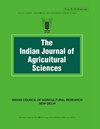桃树种质资源SSR标记分析及群体结构分析
IF 0.7
4区 农林科学
Q4 AGRICULTURE, MULTIDISCIPLINARY
引用次数: 0
摘要
为了育种计划的成功和种质资源的保护,对可利用种质资源的遗传多样性进行表征和分析是至关重要的。本实验于2022年在北阿坎德邦生物技术委员会分子生物学和基因工程实验室进行,研究41种桃[Prunus persica (L.)]的分子特征。Stokes]使用23个多态性SSR标记。检测到的等位基因数量为3 ~ 8个,平均每个位点(Na)有4.65个等位基因,共扩增出107个等位基因。每个标记平均有效等位基因数(Ne)为2.89个。SSR标记MA015a最多产生8个等位基因,其次是BPPCT 015和CPPCT14,各产生7个等位基因。多态信息含量(PIC)变化范围为0.317 ~ 0.836,平均值为0.563。观察到的杂合度较低(Ho = 0.02),期望杂合度(He = 0.61)在0.34 ~ 0.85之间。Shannon’s信息指数(I)为1.17,表明桃树基因型具有较高的多样性。Jaccard相似系数为0.533 ~ 1,表明桃源间呈双相关。聚类树形图将这些条目划分为两个主要的聚类。根据种群结构分析,将总种群划分为3组(K=3),主坐标分析(PCoA)进一步证实了这一点。研究结果对桃种质改良的分子鉴定、指纹鉴定和文献编制具有重要意义。本文章由计算机程序翻译,如有差异,请以英文原文为准。
SSR marker based profiling and population structure analysis in peach (Prunus persica) germplasm
For breeding programmes to be successful and for germplasm conservation, it is essential to characterize and analyze the genetic diversity of available germplasm. The present experiment was conducted at Molecular Biology and Genetic Engineering Laboratory of Uttarakhand Council for Biotechnology, Haldi, Uttarakhand during 2022 to study the molecular profile of 41 peach [Prunus persica (L.) Stokes] accessions using 23 polymorphic SSR markers. The number of alleles detected ranged from 3 to 8 with an average of 4.65 alleles per locus (Na) and a total of 107 alleles were amplified. The average effective number of alleles (Ne) were 2.89 per marker. The SSR marker MA015a produced maximum number of 8 alleles followed by BPPCT 015 and CPPCT14 which produced 7 alleles each. The polymorphic information content (PIC) varied between 0.317–0.836 with a mean value of 0.563. The observed heterozygosity examined was lower (Ho = 0.02) and the expected heterozygosity (He = 0.61) ranged between 0.34 to 0.85. The presence of a higher Shannon’s information index (I) of 1.17 indicates higher diversity in the given set of peach genotypes. Jaccard’s similarity coefficient ranging from 0.533 to 1, indicated a pair-wise relationship among the peach accessions. The cluster dendrogram partitioned the accessions into two main clusters. However, the total accessions were stratified into 3 groups (K=3) based on population structure analysis which was further confirmed by Principal Coordinate Analysis (PCoA). The information generated in the study may have great implications in molecular characterization, fingerprinting and documentation of accessions in the peach improvement programme.
求助全文
通过发布文献求助,成功后即可免费获取论文全文。
去求助
来源期刊

Indian Journal of Agricultural Sciences
农林科学-农业综合
CiteScore
0.80
自引率
25.00%
发文量
273
审稿时长
6 months
期刊介绍:
The Indian Journal of Agricultural Sciences publishes papers concerned with the advancement of agriculture throughout the world. It publishes original scientific work related to strategic and applied studies in all aspects of agricultural science and exploited species, as well as reviews of scientific topics of current agricultural relevance.
Specific topics of interest include (but are not confined to): genetic resources, all aspects of crop improvement,crop production,crop protection, physiology, modeling of crop systems, the scientific underpinning of agronomy, engineering solutions, decision support systems, land use, environmental impacts of agriculture and forestry, impacts of climate change, rural biodiversity, experimental design and statistical analysis, the application of new analytical and study methods (including molecular studies) and agricultural economics. The journal also publishes book reviews.
Articles are accepted on the following broad disciplines:
Agric. Engineering & Technology, Agric. Social & Economic Sci., Agronomy, Biometry, Biosciences, Cytology, Ecology, Environmental Sciences, Fertilization, Forestry , Genetics, Horticultural Sciences, Microbiology, Pest, Weed Control etc., Molecular Biology, Plant Pathology, Plant Breeding, Physiology and Biochemistry, Soil Sciences, Special Cultivation Technology, Stress Breeding, Agric. extension, and Cell Biology.
 求助内容:
求助内容: 应助结果提醒方式:
应助结果提醒方式:


